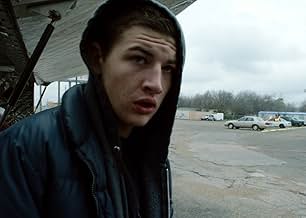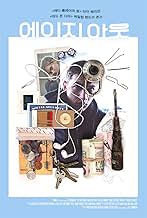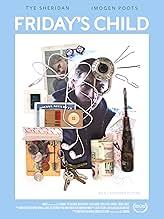IMDb RATING
6.0/10
1.2K
YOUR RATING
Fresh out of foster care at age 18, a young drifter turns to petty crime to survive, and discovers an impossible love in an unlikely friend.Fresh out of foster care at age 18, a young drifter turns to petty crime to survive, and discovers an impossible love in an unlikely friend.Fresh out of foster care at age 18, a young drifter turns to petty crime to survive, and discovers an impossible love in an unlikely friend.
- Awards
- 3 wins & 9 nominations total
Jonathan Michael Butkovsky
- Orange trustee with blue harmonica
- (as Jonathan Micheal Butkovsky)
Kyla Chatterjee
- Tortilla Tosser
- (as Kyla Brady)
- Director
- Writer
- All cast & crew
- Production, box office & more at IMDbPro
Featured reviews
Edward's Friday's Child is Polanski's Oliver Twist meets Andrea Arnold's 2016 road drama American Honey.
Edwards, editor for Terrence Malick on his 2012 drama To the Wonder, brings the brutal decision 25,000 orphans face annually in the US to the cinema in this hauntingly real drama: whether to pursue a higher education and take on immense debt, or forego education early to fight for their place in the world.
At its core, the film has a harsh honesty that will leave the audience helpless in its wake. Edwards doesn't shy away from confronting the audience and employs a full range of cinematic techniques to create as visceral and personal experience. The end result is drama that will leave the viewer shaken, gasping, and somewhere deep down, confused by the guilt and anguish they feel by the pounding resolution of Edward's cinematic masterpiece.
Right off the bat, you'll notice Edwards chooses to shoot his entire film on the same wide lens (when I mean wide, I mean very wide: probably around in the 12-18mm range). It distorts space, makes it bulbous and deep, and draws attention to the environment very consciously. Inspired by American and German photographers from the 70s and 80s, Edwards explains that when we look at the world, we're not switching constantly between different lenses, rather in reality, our eyes see through one set of lenses. It is a very confrontational choice, that forces the viewer into the rest of the world in Friday's Child. You don't get to live the drama of the film without the harsh reality it is placed in.
Tye Sheridan, Imogen Poots, and Caleb Landry Jones have standout performances. They feel real and present; the only ounce of melodrama that leaks in is at the very end of the film. Aside from that, they move about the film with the listless pace you'd expect from people trying to piece their lives together. It isn't acted - scenes are startlingly authentic, starting from minute details like the awkward gait Tye Sheridan at Richie's first high class evening party, or the reckless stride of Caleb Landry Jones's character Swim as he struts around a hotel he has no business living in. Edwards often brings the camera right up to the actor, close enough to hear their shallow breathing and notice the clenching of their jaws. The intensity of the performance lives through its subtlety, a testament to Sheridan, Poots, and Jones.
The tone of the film, largely controlled by the rich kodachrome color palette and the pressuring soundtrack from rock artist Colin Stetson (he worked on Arrival and more recently, Hereditary), is heavy and oppressive. The 3:4 aspect ratio, in combination with the unrelenting drone of the soundtrack, can leave the audience feeling just as trapped as Richie himself. It isn't without catharsis, however: in the middle of the film, Richie elopes with his new girlfriend to the midwest, and the sound track recedes to reveal the gentle ambience of the country, the colors calm down to a comfortable temperament, and the sky opens as the frame expands in wondrous 2.4:1 aspect ratio. You can almost hear the theater breathe a collective sigh of relief.
Ultimately, the film revolves around freedom. In the opening minutes of the film, Richie's school counselors tell him, "You know what we call aging out? Emancipation." Edwards presents us with an authentic story rooted in the real problems of orphans all over the United States, while pressing us to live out their struggles with realizing what freedom really means in the "Land of the Free". While we can never completely understand the stories of these orphans from this side of the camera, Edwards offers us something remarkably close that, if not moving us into action, forces us to truly celebrate and fight for Emancipation some of us have the luxury of possessing.
Edwards, editor for Terrence Malick on his 2012 drama To the Wonder, brings the brutal decision 25,000 orphans face annually in the US to the cinema in this hauntingly real drama: whether to pursue a higher education and take on immense debt, or forego education early to fight for their place in the world.
At its core, the film has a harsh honesty that will leave the audience helpless in its wake. Edwards doesn't shy away from confronting the audience and employs a full range of cinematic techniques to create as visceral and personal experience. The end result is drama that will leave the viewer shaken, gasping, and somewhere deep down, confused by the guilt and anguish they feel by the pounding resolution of Edward's cinematic masterpiece.
Right off the bat, you'll notice Edwards chooses to shoot his entire film on the same wide lens (when I mean wide, I mean very wide: probably around in the 12-18mm range). It distorts space, makes it bulbous and deep, and draws attention to the environment very consciously. Inspired by American and German photographers from the 70s and 80s, Edwards explains that when we look at the world, we're not switching constantly between different lenses, rather in reality, our eyes see through one set of lenses. It is a very confrontational choice, that forces the viewer into the rest of the world in Friday's Child. You don't get to live the drama of the film without the harsh reality it is placed in.
Tye Sheridan, Imogen Poots, and Caleb Landry Jones have standout performances. They feel real and present; the only ounce of melodrama that leaks in is at the very end of the film. Aside from that, they move about the film with the listless pace you'd expect from people trying to piece their lives together. It isn't acted - scenes are startlingly authentic, starting from minute details like the awkward gait Tye Sheridan at Richie's first high class evening party, or the reckless stride of Caleb Landry Jones's character Swim as he struts around a hotel he has no business living in. Edwards often brings the camera right up to the actor, close enough to hear their shallow breathing and notice the clenching of their jaws. The intensity of the performance lives through its subtlety, a testament to Sheridan, Poots, and Jones.
The tone of the film, largely controlled by the rich kodachrome color palette and the pressuring soundtrack from rock artist Colin Stetson (he worked on Arrival and more recently, Hereditary), is heavy and oppressive. The 3:4 aspect ratio, in combination with the unrelenting drone of the soundtrack, can leave the audience feeling just as trapped as Richie himself. It isn't without catharsis, however: in the middle of the film, Richie elopes with his new girlfriend to the midwest, and the sound track recedes to reveal the gentle ambience of the country, the colors calm down to a comfortable temperament, and the sky opens as the frame expands in wondrous 2.4:1 aspect ratio. You can almost hear the theater breathe a collective sigh of relief.
Ultimately, the film revolves around freedom. In the opening minutes of the film, Richie's school counselors tell him, "You know what we call aging out? Emancipation." Edwards presents us with an authentic story rooted in the real problems of orphans all over the United States, while pressing us to live out their struggles with realizing what freedom really means in the "Land of the Free". While we can never completely understand the stories of these orphans from this side of the camera, Edwards offers us something remarkably close that, if not moving us into action, forces us to truly celebrate and fight for Emancipation some of us have the luxury of possessing.
Not terrible. Not great. I was expecting a depressing film about aging out of the foster care system, but this was merely the setting for the film, although it's definitely depressing. The cinematography was interesting, and some scenes were shot quite beautifully. The actors did a fine job. Overall, it was just okay.
Once in a great while we have the opportunity to watch a "movie" that allows us to set on the shoulder of its characters, and observe the world that they live in. Taxi Driver and Midnight Cowboy come to mind. I am not saying this effort is in that astronomical realm, but it's not too far behind.
Imogen Poots has taken advantage of some great parts and should be considered for a high-end lead. Her understated Joan overcomes a few script deficiencies (they meet because she doesn't know who to drive a standard shift SUV). She's understandably frustrated, probably because they don't make any of those outside of Yugoslavia. Caleb Landry gives an extraordinary performance as "Swim." Occasional Hi Def, natural light scenes offer beautiful segues. Low cost but interesting, very visual sets. Definitely worth your time.
Imogen Poots has taken advantage of some great parts and should be considered for a high-end lead. Her understated Joan overcomes a few script deficiencies (they meet because she doesn't know who to drive a standard shift SUV). She's understandably frustrated, probably because they don't make any of those outside of Yugoslavia. Caleb Landry gives an extraordinary performance as "Swim." Occasional Hi Def, natural light scenes offer beautiful segues. Low cost but interesting, very visual sets. Definitely worth your time.
If you feel fragile, dont view this film, because its a socialrealistic gem for the scholard and artseeking part of the audience. its an uncomfortable saga about a young man that has aged out of the foster care system, and is thrown out to the wolfes in the jungle of real life and danger.
its a film that mirrors the weakneses sosciety has when it comes to the orphans among us, they are met with demands everywhere, and the odds they have to win this race are very low so, as with this main character, he is leaning up to the wall of law, having his mugshots doen. its a somewhat psychedelic chaotic way of life and living presented , and its a heavy piece of art to watch. the score eventually also amplifies this feeling, and in the end your deemed to carry it with you in your conciousness for weeks and years to come. the acting are well done, but the story are like an ekg-diagram with extreme ups and downs.
the grumpy old man might have missed the point, but it will not be a rewatch, its too saggy for me.
its a film that mirrors the weakneses sosciety has when it comes to the orphans among us, they are met with demands everywhere, and the odds they have to win this race are very low so, as with this main character, he is leaning up to the wall of law, having his mugshots doen. its a somewhat psychedelic chaotic way of life and living presented , and its a heavy piece of art to watch. the score eventually also amplifies this feeling, and in the end your deemed to carry it with you in your conciousness for weeks and years to come. the acting are well done, but the story are like an ekg-diagram with extreme ups and downs.
the grumpy old man might have missed the point, but it will not be a rewatch, its too saggy for me.
Acting good and realistic almost doccie like film giving it a very realistic feel...but ohhhh so drawwwwn out!...I just wanted it to end before I aged out and turned the light's out!
Did you know
- TriviaSwim's name comes from the common internet acronym "Somebody Who Isn't Me", used when meaning to disguise one's identity on larger web forums.
- SoundtracksPeter
Written by Nils Frahm
Performed by Nils Frahm
Permission of Manners McDade Music Publishing Ltd.
Courtesy of Erased Tapes Record
- How long is Age Out?Powered by Alexa
Details
- Runtime
- 1h 31m(91 min)
- Color
- Aspect ratio
- 1.33 : 1
Contribute to this page
Suggest an edit or add missing content


















